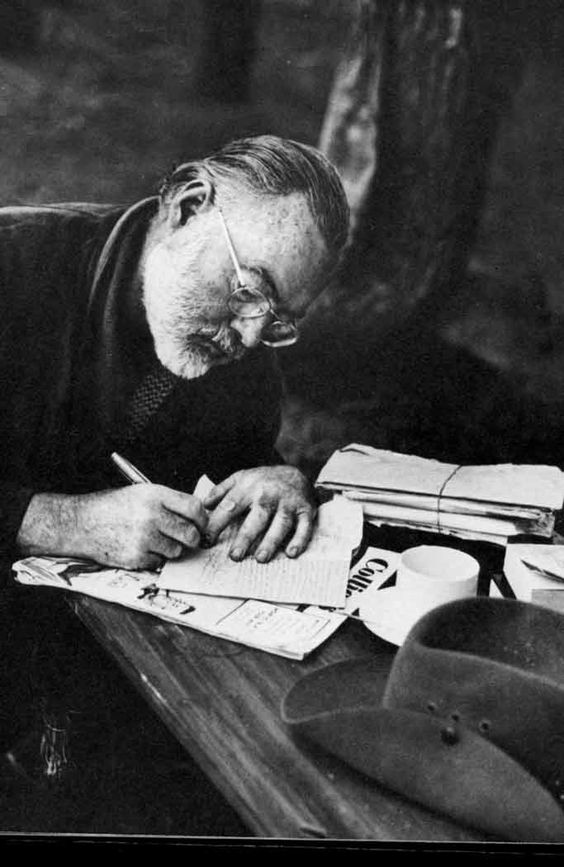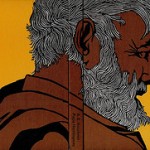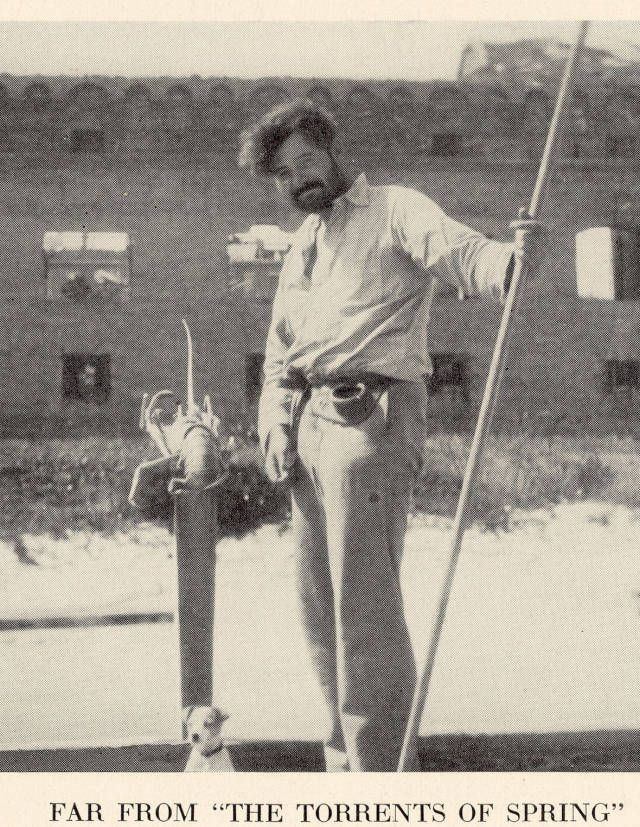
It is awfully easy to be hard-boiled about everything in the daytime, but at night it is another thing. The Sun Also Rises, Ernest Hemingway
There is no lonelier man in death, except the suicide, than that man who has lived many years with a good wife and then outlived her. If two people love each other there can be no happy end to it.
Ernest Hemingway
Hemingway killed himself on July 1, 1961. It’s sad to think about but he was true to himself to the end. His great companion, A. E. Hotchner, who just passed away himself within the past several months, wrote an essay about the death and I attach the link here.

Hotchner met Hemingway while doing a story for Cosmopolitan, which was about the future of everything: art, music, theater, and literature. They asked a young journalist to go down to Cuba and interview Hemingway. I won’t repeat what I’ve written before about their meeting.
Suffice to say for this post that Hotchner remained to the end a trusted confidant, hell-raiser when necessary, collaborator on projects, and loyal friend. As he notes in his article, he dramatized many of Hemingway’s stories and novels for TV and the movies, and they traveled through Europe together often.

Hotchner, in his article, notes that Hemingway called him in May of 1960 from Cuba. Hem had been asked by Life magazine to cut a 92,000 word article down to 40,000. A month later, Hem had only cut out about 534 words. He asked Hotchner to come to Cuba to help him. He did go and got the job done, but Hotchner noted that Hem was “bone tired and very beat up.” He assumed that after a period of rest, Hem would be back to his hale old self.
Much has been written about Hemingway’s paranoia and the last year of his life. He felt that the feds, the FBI, the IRS or all were following him and out to get him. During dinner with Hem and Mary (Hemingway’s fourth wife), Hem indicated halfway through the meal that they had to leave because two FBI agents at the bar were watching him. At the time Hemingway was working on A Moveable Feast, having difficultly, although most of the Paris sketches were all set and down on paper. He often spoke of suicide. His father had killed himself.

During the last eight months of Hemingway’s life, he received eleven electric shock treatments at St. Mary’s Hospital in Rochester, Minnesota. During a short release, he attempted suicide twice with a gun; on a flight to the Mayo Clinic, he tried to jump from the plane. When it stopped in Casper, Wyoming, for repairs, he tried to walk into the moving propeller.
When Hotchner visited him in June, he’d been given a new series of shock treatments and insisted that his room was bugged. When Hochner asked him, “Papa, why do you want to kill yourself,” he replied, “What do you think happens to a man going on 62 when he realizes that he can never write the books and stories he promised himself? And do any of the other things he promised himself on the good days?” Hotchner noted that he’d written a beautiful book about Paris and Hem replied, “The best of that I wrote before. And now I can’t finish it.”

When Hotch suggested he could relax or retire, Hem noted, “How does a writer retire? Everywhere he goes he hears the same damn question: what are you working on?”
The irony is that decades later in response to a Freedom of Information petition, the FBI released its Hemingway file. J. Edgar Hoover had placed Hemingway under surveillance because he was suspicious of his activities in Cuba. Agents filed reports and tapped his phones. The surveillance continued all through his confinement at St. Mary’s Hospital and it’s likely that the phone outside of his room was tapped after all.
Hotch ends the article noting that he believes Hemingway truly sensed the surveillance and that it contributed to his anguish and his suicide.
The above borrows heavily from the article by A. E. Hotchner, so I urge you to read it directly. Hotchner also wrote the wonderful book “Papa Hemingway” and “Hemingway and His World.” I love his writing and his view of Hem as a true friend, not just as “Hemingway.” There’s not a better source, in my opinion, for getting a real flavor of what it was like to be part of Hemingway’s posse and inner circle.
http://www.nytimes.com/2011/07/02/opinion/02hotchner.html?pagewanted=all&_r=0
RIP, Hem.

young man: all of it ahead of him.


Thank you Christine for this post I have noted the two books by
AE Hotchner I will look forward to reading them. Writing was his life and what a life !! Suicide is a tragic situation for us remaining he made his choice like a story the last page the end.
Exactly, Pamela. It is sad and he looked much older than he was. However, living for him was about how he lived and if he couldn’t write (or enjoy food, drink, women) it was not worth living. Especially the writing. When he couldn’t finish A Moveable Feast, i think it was too much. The electric shocks at Mayo did his memory in and of course, he was his own worst enemy with his self-abuse and hard living, the plane accidents. It all crashed in. Sad to lose him too soon. Thank you as always for reading. I appreciate it more than i can say. Best, Christine
Christine-
It’s always nice to read another Writer’s words about a writer that both have feelings for. After watching about everything Hemingway I can, after reading everything Hemingway I have, along comes the Novick-Burns documentary to add to my collection. I learned things from it I never anticipated learning, a things I could have left in a file somewhere, forgotten.
As Hem called him, Hotch, was quite a person. A writer who could cover any topic, an editor and then a salad dressing philanthropist with Paul Newman. I have a Paul Newman connection, however so tenuous as it maybe. I once tripped over Newman’s feet in a pit area while running excitedly to let my team know we’d just bought the cast-off spare tires from Bob Sharp Racing that Newman raced for at a sports car race in California. I learned later that PL Newman, whose helmet I noted as I was tripping over his feet, was the actor Paul Newman. I think he’d have preferred to have been known as PL Newman, race car driver and actor, rather than the other way around. Regardless, I found out at the next race that Newman had sent word to our pit that he hoped I was OK after taking the tumble. I was. We lost Newman in 2008, Hemingway in 1961, when I was 2 years old and Hotch the year I turned 61.
I didn’t start reading Hemingway until my junior high school had begun and an English teacher assigned The Sun Also Rises for us in my 8th grade year. I wasn’t sure I liked his style then, so I read A Farewell to Arms to test the theory. It stuck and I liked his work. Then, I got a bit stirred up and watched Gary Cooper and Ingrid Bergman in For Whom the Bell Tolls on late TV one night. It was a mistake to do that before I’d read the book. I did get around to seeing A Farewell to Arms with Cooper and Helen Hayes, long after I’d read the book, and that was OK. Book first, movie second. Oh, by the way, if you like Hemingway don’t see the remake of A Farewell to Arms with Rock Hudson and Jennifer Jones, especially if you liked the book. Just trust me on that one.
The Novick-Burns documentary was certainly worth watching, enough so for me that I recorded all six hours of it. The John McCain segments were touching, though I’m hardly a Republican. I’m pretty sure Senator McCain knew he wasn’t going to live a lot longer and facing knowing his end date was near, he chose to be totally honest stating his desire to be a hero like Robert Jordan in For Whom the Bell Tolls. Considering one of his last acts in Congress was to give Trump the finger has got to be one of his finest moments, at least in my estimation. I recently watched the film with my wife and we both enjoyed it. Sometimes things don’t change so much that they’re precisely the same, if that makes any sense to you.
Sorry, at this time of night my brain gets really tangential. Back to Hotch. What a nice book he wrote with Papa Hemingway. I’m rereading it just now, as I’m doing that with a lot of Hem things at the moment, inspired by the documentary. I have a lot of little things in common with Hemingway: I was born on July 19th, I have had between 30 and 40 concussions while serving in the military and have an intractable migraine, tinnitus, PTSD & other maladies. I’m a recovering alcoholic and have been on the wagon for 9 years last 3 April. I’m also a writer, though most of my writing took place either for law firms writing Appellate Court briefs or articles in newspapers. My first novel was published by a company that went out of business just as my book was supposed to come out and then my ex-wife threw out the only other copy of my novel, aside from the one the publisher had and yes, she did that intentionally. There’s a word for people that do things like that out of spite, but I can’t quite put my finger on it. I’m sure that if my wife were awake she could tell us in a heartbeat.
I enjoy reading your work and look forward to reading more of it, as long as my head holds out.
Many thanks~
Kia
Dear Kia (R.M.) Wow there is so much above that i want to comment on, echo, get into a good discussion! I loved reading the above. Hotchner was a wonderful friend and his book was where it all started for me. The gusto for life that Hem had and that Hotch showed was so attractive and inspiring to me at age 21. I know that is just one side of Hem and there was the dark but it all made up who he was. Hilarious about Paul Newman. I laughed about that! And the John McCain part of the Documentary was very touching and moving to me, as it was to you. And I am a lawyer too in my other life and a writer of fiction in another part of my life. Thank you so much for writing and commenting. I found it all so interesting! (Oh gosh re your book! What a saga and what a bad stroke with the publisher going under as your book was doubt to see light.What the heck!) Anyway, please keep reading him and studying him and thank you for reading this blog. No hidden bias here. I’m on his side even knowing his issues and dark side. Warmest wishes, Christine